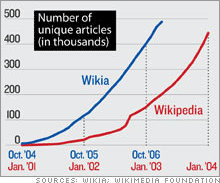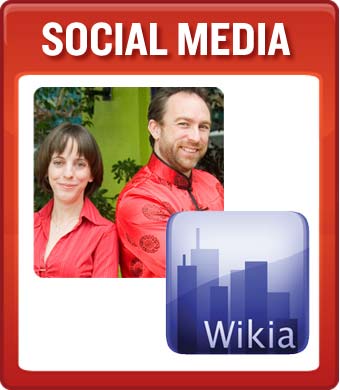Wikipedia has become one of the largest and most collaborative sites on the Internet--but its founder has yet to make his fortune. Now Jimmy Wales is on the road, hunting for riches with a new for-profit company built on the same wild and wiki idea.
By
Tom McNichol, Business 2.0 Magazine senior writer
April 3 2007: 10:00 AM EDT
(Business 2.0 Magazine) -- Jimmy Wales may have created the world's largest encyclopedia, but he can't keep his inbox in order. In the back of a black London cab, careening from one high-powered meeting to the next, Wales sits hunched over his Sidekick.
If his e-mail were run like Wikipedia, Wales's pride and joy, he'd have thousands of strangers reading and editing it for him. Instead, he's struggling to find messages from such Wikipedia fans as Peter Gabriel and Richard Branson.
 |
| Wikipedia founder Jimmy Wales is on the road, hunting for riches with a new for-profit company built on the same wild and wiki idea. |
 |
| Wikia is catching up to Wikipedia. Its growth in number of articles is greater than that of Wikipedia in its first three years. Wikia's pageviews per day are 2.5 million and rising. |
 |
| Wales co-founded Wikia with Angela Beesley, a British Internet entrepreneur and Wikipedia contributor. |
 |
| Wales runs his business - and his life - frugally. He used to have a Ferrari, but now drives a Hyundai. |
 |
| Marten Mickos is CEO of MySQL, which developed Wikipedia's open-source software. He calls Wikia a "powerful business proposition." |
|  | | Why does Business 2.0 Magazine identify Revision3 as a startup to watch? Its popular online show, 'Diggnation,' says it all. | Play video
|
|
|
"Bono was complaining that I wasn't returning his e-mails," Wales says, not looking up from the tiny screen. "It turns out, they were in my spam folder."
Bono's e-mail messages in with the junk? That's just one sign that Wales has arrived. Being the founder of one of the signature Web 2.0 applications - a user-generated encyclopedia that's now 42 times bigger than the Encyclopaedia Britannica and viewed 7 billion times every month - can open a lot of doors.
But Wales isn't in London to hobnob with the rich and famous. He has a bigger challenge: spinning his Internet fame into Internet gold.
The irony of Wikipedia is that, although it was founded by a former securities trader and experienced entrepreneur, it has yet to make anyone rich. Wikipedia was launched in January 2001, long before such upstarts as MySpace (2003) and YouTube (2005), but Wales built his site without a mechanism to capitalize on its success.
Had it not been set up as a nonprofit - free of advertisements and promotions -Wikipedia could easily have generated hundreds of millions of dollars in ad revenue. Wales, an Ayn Rand small-l libertarian, figured that user devotion could be harnessed to make Wikipedia-like products that bring in a buck or two.
So Wales decided to find out - one cautious step at a time. In October 2004 he co-founded a for-profit company, now called Wikia, with Angela Beesley, one of a handful of Wikipedia contributors who now collect paychecks from Wikia. (There are still only five employees on the payroll of the Wikimedia Foundation, which administers Wikipedia.)
Two years later Wales stepped down as foundation chair. Last June he hired Gil Penchina, an angel investor and former eBay vice president, to be Wikia's CEO and set up offices in San Mateo, Calif. "I'm not real good at the administrative part of running a company," Wales admits.
What he does offer is the vision thing, and the vision behind Wikia is pretty simple: Use the wiki model - and Wikipedia's most dependable volunteer editors - to build moneymaking websites. Advertising is provided by Google AdSense, with the click-through revenue funneled to Wales and his investors. If those sites draw even a fraction of Wikipedia's more than 160 million monthly unique visitors, Wales could soon be as rich as he is famous.
In keeping with Wales's low-key style (he flies coach, drives a Hyundai, and admonishes people to call his cell phone sparingly when he's in Europe, since rates there are so high), the early entries in the Wikia stable are fairly modest.
Most are user-generated sites dedicated to topics as diverse as Star Wars (the so-called Wookiepedia) and pet diabetes. Cult TV shows such as Lost, Star Trek, and 24 have large Wikia sites, as do computer games like Doom and Final Fantasy. There are also Wikia sites devoted to less geeky subjects such as genealogy, travel, smoking cessation, and political campaigns, but none seems destined to be a massive moneymaker.
In December, however, Wales announced - as a casual aside - that Wikia would produce an open-source search engine, a kind of user-generated alternative to Google (Charts). Unlike Google, which guards its secret search algorithms as tightly as Coca-Cola (Charts) guards its soft-drink formulas, Wikia will make its search criteria transparent and invite outside programmers to help improve them. As Wales describes it, the Wikia search engine will rely on human intelligence to do what algorithms can't - give commonsense search results.
The news that Wikipedia was going to take on Google with a collaborative software model hit the tech trade press like a bombshell. ("Jimmy Wales will destroy Google," wrote veteran online publisher R.U. Sirius.) Wales had to struggle to damp down such enthusiasm for a project that was barely off the ground and is unlikely to produce anything tangible for several months.
But as Wales soon discovered, he's now playing the game in a different league, thanks to Wikipedia's high profile. In the early days of the encyclopedia project, the site's obscurity covered a multitude of sins. "When we first launched Wikipedia, most of the entries really weren't that good," he recalls. "The entry for Africa was something like 'Africa is a continent.' But nobody really cared for the first three years. We could fix things without anyone paying attention."
That's all changed. "I can't do anything quietly anymore," he says. "As soon as I mentioned the search project, we got a huge rush of people getting in touch with us. All sorts of people who have been thinking about how to improve search have come out of the woodwork. I didn't anticipate that. But now I think, 'Wow, the world is kind of waiting for this.'"
Entrepreneurial love fest
The world is waiting for Wales in more ways than one. His London cab screeches to a halt, and he's off to the BBC for a series of radio interviews. Here Wales shares airtime with Forest Whitaker, who is, as Wikipedia informs us, "an Oscar-nominated, Golden Globe and SAG Award winning American actor of film, stage and television, as well as a producer and director."
Add one more title to that: Wikipedia enthusiast. Whitaker says he consults the site to research film projects, such as the Idi Amin role in The Last King of Scotland that won him his Oscar nod. (Update: Whitaker won the best-actor Oscar on February 26, after this story went to press.)
Despite a few awkward questions about some of the strange inaccuracies in Wikipedia's entries (more on that later), this BBC interview, like most subsequent ones, turns out to be something of a love fest; one listener e-mails the station to say that Wikipedia "is one of the few that fulfill the vast potential of the Internet."
Wales's efforts to raise funds for his new venture have been love fests of another sort. In March 2006, Wikia raised a $4 million round of funding from Bessemer Venture Partners, Omidyar Network, and a list of angel backers that reads like an Internet Hall of Fame: Marc Andreessen, Reid Hoffman, and Mitch Kapor.
In the fall, Amazon.com (Charts) also kicked in an undisclosed amount, a deal driven by founder Jeff Bezos's longstanding interest in Wales's work. Bezos has singled out Wikipedia as the site that "cracked the code for user-generated content" and once told Wales that he wished he had designed Amazon's user reviews of books and CDs to be more like collaborative wiki pages.
Although Wikia has yet to achieve as high a profile on the Web as Amazon or Wikipediam - or show much of a return for its investors - nobody seems to be in much of a hurry.
"It's a long-term project," says Jeremy Levine, a Bessemer partner. But Wikia is starting to gather momentum. More than 30,000 people have created nearly 500,000 Wikia articles in 45 languages. Collectively, the sites are attracting about 2.5 million pageviews a day, slightly more traffic than the website of the Los Angeles Times. Wikia's growth in pageviews, in fact, is a bit better than Wikipedia's was at the same stage of its development.
"So far, the traction looks great," Levine says. "Wikia can be three to five times bigger at the end of the year and then do it again. When you do that over a few years, you get to be pretty big."
Still, unlike Amazon in its early days, Wikia is not trying to grow exponentially. Wales claims that he could have raised at least $12 million in funding for Wikia but is sticking to his deliberate approach, and he displays an almost cavalier attitude toward his bottom line. "This is going to sound ridiculous, but I don't even know what Wikia's revenue was last year," he says. (Wikia's Penchina does know the company's revenue but declined to release the figure.)
Wales built Wikipedia on a shoestring budget. Its revenue is derived almost entirely from user donations, and the foundation that administers the site took in only $1.5 million in 2006. Wikia, by contrast, is set up to make money. It has a roster of 40 employees, and for the next year or so, they plan to devote most of their time to building out the site's tools and software to make it easier for users to construct wikis around their favorite obsessions.
Then Wikia can figure out ways to better monetize the growing traffic. As Levine puts it, "Content begets eyeballs, eyeballs beget business model."
Eureka moment
Nothing in Wales's past quite prepared him for the place he finds himself in today. He began his career in academia, earning a master's degree in finance from the University of Alabama and later teaching the subject at Indiana University. From 1994 to 2000, he was a research director at Chicago Options Associates, a futures and options trader. By betting on fluctuations in interest rates and currencies, he made enough money to take a few years off and explore the business opportunities offered by the Web.
His first effort was a search portal called Bomis, which created and hosted Web rings around popular search terms - including, not surprisingly, a lot of adult themes. His second was a free online encyclopedia project called Nupedia. But its growth was hampered by strict top-down rules on who could contribute content to the project. "It just didn't work," Wales says. "It wasn't much fun for people."
In an effort to jump-start Nupedia, Wales turned to the wiki, a system that had been developed in 1995 by computer programmer Ward Cunningham as a fast way to build public knowledge bases. ("Wiki" comes from a Hawaiian word meaning "quick.") Cunningham's software let visitors to a site add, delete, and otherwise manipulate Web content, typically without needing to register.
The switch to wiki turned out to be the breakthrough Wales needed. The newly named Wikipedia launched on Jan. 15, 2001, and quickly surpassed Nupedia in size and reach. "After about two weeks on the wiki model, we had accomplished more than we had in two years," Wales recalls.
Since then, Wikipedia has metastasized into one of the Web's most popular and recognized sites. And Wikipedia has helped to put the "worldwide" back into the World Wide Web: More than two-thirds of Wikipedia's 5.3 million articles are written in a language other than English.
The work of a few
Wikipedia is famous for tapping into the wisdom of the crowd. What's not as well known is how small the core crowd actually is. Half of all edits on the English-language Wikipedia can be traced to just more than 1,000 people. Wikipedia is better at getting a handful of people utterly obsessed with a project than at mining the expertise of the millions who use it.
Which raises questions about the business model on which Wikia is based. What if those core users were contributing precisely because it was a nonprofit project? Will they contribute with the same enthusiasm if they're building a network of community sites for the enrichment of Jimmy Wales & Co.? Why would any user who is not being paid go to the trouble of building a site on Wikia?
CEO Penchina answers with a question of his own: "Why do people play basketball when NBA players get paid?" And then he answers his own question: "People contribute because it's fun, because they want to share, because it's social, or to show their expertise."
Of course, no one has ever built a successful business around pickup games of basketball. Still, it's not as though Wikia doesn't offer users anything in return for their unpaid efforts. Hosting a site on Wikia saves them the trouble of installing and maintaining their own wiki software, or buying server time or domain names. It also provides users with instant access to an already sizable online community.
Wales says he won't sweeten the pot for Wikia contributors by offering them a share of the ad revenue from their pages - unlike YouTube, which announced in January it would soon start doing such deals with its video makers. A Wikia initiative called OpenServing does offer website owners free hosting and bandwidth, with tentative plans to require links back to Wikia. But OpenServing has been slow to set up accounts, and Penchina admits he doesn't yet know how it will drive revenue.
While Wikia retains any ad revenue generated by the users, the company doesn't own the content - any more than the content on Wikipedia is owned by the foundation. Wales believes this will make Wikia sites stand out.
"Why should someone read the Wikia site about 24 rather than the Fox network fan site?" he asks. "Well, for one, our site is much bigger; it has a lot more information. But more important, if the show starts going south, or someone gets hold of a leaked script, is the network site going to let people write about that? The free license part of Wikia limits our control. If the community gets mad at us, they can just leave and take the content with them. That alone keeps the relationship honest."
Wales also puts his faith in the open-source model. He cites Linux reseller Red Hat (Charts), a for-profit company built on top of a free, open-source software foundation. Many doubted Red Hat could build a profitable business around something as defiantly not-for-profit as Linux, but the Raleigh, N.C., company proved them wrong. Third-quarter revenue for Red Hat was $105.8 million in 2006, up 45 percent from the previous year.
"A lot of people who work on open-source software don't mind making money elsewhere," Wales points out. "They aren't anticommercial."
That may be, but Wikia's founders are careful to hedge their words with rhetoric about the company's righteousness. "We are a for-profit company, but our investors and employees are equally focused on the social mission," Penchina says. "We hope to prove that you can build a sustainable business without copyrights, to serve our communities, and to enable advocacy on important topics like politics."
So far Wikia does appear to have the backing of the open-source community. "It's a very powerful business proposition to make a useful product out of something that consumers create," says Marten Mickos, CEO of MySQL, which developed the open-source database software used by Wikipedia. "This is how Google works - you create the websites and you create the searches, and that's why advertisers have a desire to display their ads on Google's site."
Even if Wikia doesn't approach the popularity of Wales's online encyclopedia, that still leaves plenty of room to build a thriving and profitable business. "Wikia can scale," Mickos says. "It probably won't scale as much as Wikipedia, but that's not necessarily an issue. A 100th of the scale of Wikipedia might already be a good business."
It's hard to hate kittens
Late in the day, we find Wales at the London School of Economics and Political Science. He's about to give a lecture to a group of eager graduate students when one of the school's instructors bounds up to shake his hand. "I'll give you a brief introduction before you go on," he says, waving a piece of paper. "Just a bit of biographical information that I downloaded from Wikipedia."
A look of mild alarm crosses Wales's face. "You'd better let me have a look at that first," he says. Sure enough, Wales's own Wikipedia entry contains an error, misstating his date of birth. The error, which stems from a mistake on Wales's birth certificate, is something of an inside joke among hard-core Wikipedians, who keep deliberately reintroducing it despite Wales's best efforts to correct the record.
Questions about the trustworthiness of Wikipedia's entries - and, indeed, any user-generated content - haunt Wales wherever he goes. The most famous incident may be the 2005 entry that identified former Robert Kennedy confidant John Seigenthaler Sr. as a possible suspect in the murders of RFK and his brother. That error prompted Seigenthaler to denounce Wikipedia as "a flawed and irresponsible research tool."
But user-generated is also user-corrected, and Wikipedia manages to flourish despite its flaws. "People take issue with individual aspects of Wikipedia all the time," Wales says. "But it's kind of hard to hate the general idea of a free encyclopedia. It's like hating kittens."
For all its high-profile mistakes, Wikipedia isn't actually that inaccurate. Its heaviest users patrol the site like guard dogs, watching for vandalism and combing out unsourced facts. A 2005 study by the journal Nature found that the typical Wikipedia science article contained only slightly more errors than similar articles in the Britannica. (Britannica has disputed Nature's claim.) The venerable printed compendium, meanwhile, commits many more sins of omission. Wikipedia boasts 5.3 million articles, while Britannica, even including its online versions, has only 120,000.
Wikia's business model neatly sidesteps the inaccuracy issue. Whereas an encyclopedia focuses on facts, Wikia is a vehicle for passion and opinion. There is some content overlap between Wikipedia and Wikia, but the latter reads more like a cross between a fan site and a travel guide. Wikia is also about tapping into the wisdom of the crowd, even if it sometimes results in more crowd than wisdom.
Google killer or vaporware?
Then there's the nascent Wikia search engine. Larry Sanger, who helped create Wikipedia before leaving the project in 2002, says this isn't the first time Wales has considered such an idea. "Jimmy has been trying to organize people to fill up a search database since before Wikipedia started," Sanger says. "He's tried a few different ways, and no way that he's tried so far has worked. There's a pretty good chance this won't either."
Wales concedes that he has a long slog ahead of him. "The first thing we put up is probably going to suck," he says. "But we'll put something on the front page that says, 'Yes, we know this sucks, but see if you can make it better, and check it out again in a few months.' My motto is 'Release early, release often.' A closed beta is just not my style."
The notion of Internet denizens building a better search engine than Google does, at first, seem preposterous. Then again, the idea of building a gigantic online encyclopedia on the goodwill of strangers seemed crazy once. Wiki creator Cunningham saw profit potential in his invention right away, though he couldn't figure out how to make it work as a business.
"But we're in a different situation now," Cunningham says. "The Web touches so many people that a wiki-based business can work. People really understand the power of wiki."
Nowhere is that clearer than at the end of Wales's hectic day in London. The Wikipedia king enters the Montague Pike, a crowded pub on Charing Cross Road, for drinks with Britain's key volunteer editors. There's a flurry of excitement when Wales makes a late arrival. Cameras flash, glasses are raised, flesh is pressed.
But before long, a curious thing happens: The Wikipedians begin to ignore Wales. Half a dozen small discussions break out, each one a tiny wiki community come to life.
The irony of the wiki world is this: The larger and more successful it gets, the less its founders have to do. "I'm sort of like a British monarch," Wales says, smiling. "I have steadily declining powers over time." British royals also make a lot of public appearances, then sit back and rake in money from their large land holdings.
If Wales is successful in building his vast virtual wiki empire - wiki fan sites, wiki search engines, wiki hosting - his analogy may be more accurate than he thinks. For the wiki king, the true power may lie in bringing people together so they can rule themselves.
Addendum: Wales was in the Web 2.0 business before there was such a term. He launched his collaborative encyclopedia in January 2001, two years before MySpace and four years before YouTube. Here are Wales's five rules for tapping into the enthusiasm of users. 














 Founder Mark Zuckerberg and the other executives at Facebook changed social networking forever on Thursday, with the announcement that their site would no longer be just a place for people to link up with friends, join interest groups and share multimedia content. Instead,
Founder Mark Zuckerberg and the other executives at Facebook changed social networking forever on Thursday, with the announcement that their site would no longer be just a place for people to link up with friends, join interest groups and share multimedia content. Instead,